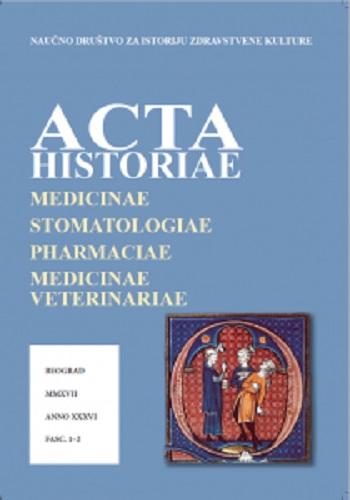Republicanism, Political Changes and Mental Illness in Portugal (1889–1926)
Republicanism, Political Changes and Mental Illness in Portugal (1889–1926)
Author(s): Teresa NunesSubject(s): Comparative history, Government/Political systems, Health and medicine and law
Published by: Naučno društvo za istoriju zdravstvene kulture
Keywords: Portugal; mental illness; Republicanism; mental health reforms
Summary/Abstract: For the last decades, Portuguese historiography has been well aware of republican movement and, subsequently, party, founded in 1876, analysing its complexities, ideological heterogeneity, political options and the nature of public intervention until 1910, being this a year decisive moment of institutional rupture in Portugal, by the rise of republican regime.Although the continuous efforts, some topics on Portuguese republicanism and Republican Regime remain not fully understood in a comprehensive manner, relevant in order to achieve a broader framework to Portuguese political ideas and opposition’s nature or practice to monarchical liberal system. One of these aspects is the construction of republican discourse on public health and, more particularly, on issues of mental sanity since July 4th 1889, year of mental illness bill, up to 1910. The present paper intends to give some contributions on the matters previously appointed. Structured in three parts, the text aims to provide a characterization of Portuguese situation on mental illness during the second half of 19th century. Based on institutional sources – government’ journals, diaries of legislative chambers, hospitals balances and documents from kingdom’ ministry – scientific reports and press, the first part introduces a global frame regarding data for people affected, specialized facilities, the insertion of psychiatric illness on general hospitals, the relation between mental diseases and charity institutions, most frequent treatments and financial resources associated. The second part relies on the analysis of republican propaganda and interventions on mental diseases, in order to understand the role and relevance played in the images built by Republic Party on Portuguese monarchical’ institutions. Special emphasis should be given to the works produced by eminent republicans, with degree in medicine, António José de Almeida (1866–1929), and others, specialized on mental diseases like Miguel Bombarda (1851–1910) or Egas Moniz (1874–1955), by a systematic use of scientific arguments to criticized the Portuguese political structures, considered as the result of straight relation with Catholic Church. On the other hand, the same kind of scientific arguments would be applied to underline the structural incapacities intrinsic to royal families and, for extension, the harmful associated to monarchist administration (Antão de Melo, A Imbecilidade e Degenerescencia das Famílias Reais, Lisboa, 1908). The third part is devoted to transformations projected on new institutional environment and those effectively executed on mental illness assistance after the proclamation of Portuguese Republic. Particular attention should be provided to bill approved on this issue in 11th April 1911, to underline main republican options, observing its implementation and limitations. The analysis ought to be also focused on controversial relations between laicist Republic and religious congregations, expelled out of the country in October 1910; the one of the exceptions being the order of Saint John of God, devoted to mental diseases patients.
Journal: Acta historiae medicinae, stomatologiae, pharmaciae, medicinae veterinariae
- Issue Year: 2017
- Issue No: 36
- Page Range: 76-91
- Page Count: 16
- Language: English

